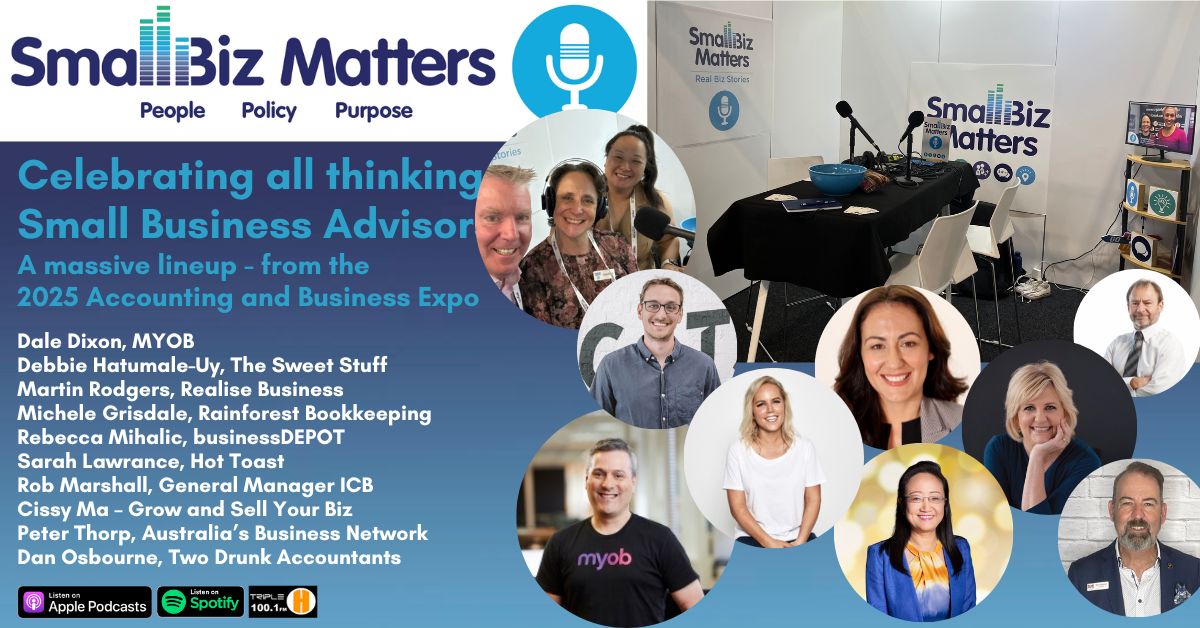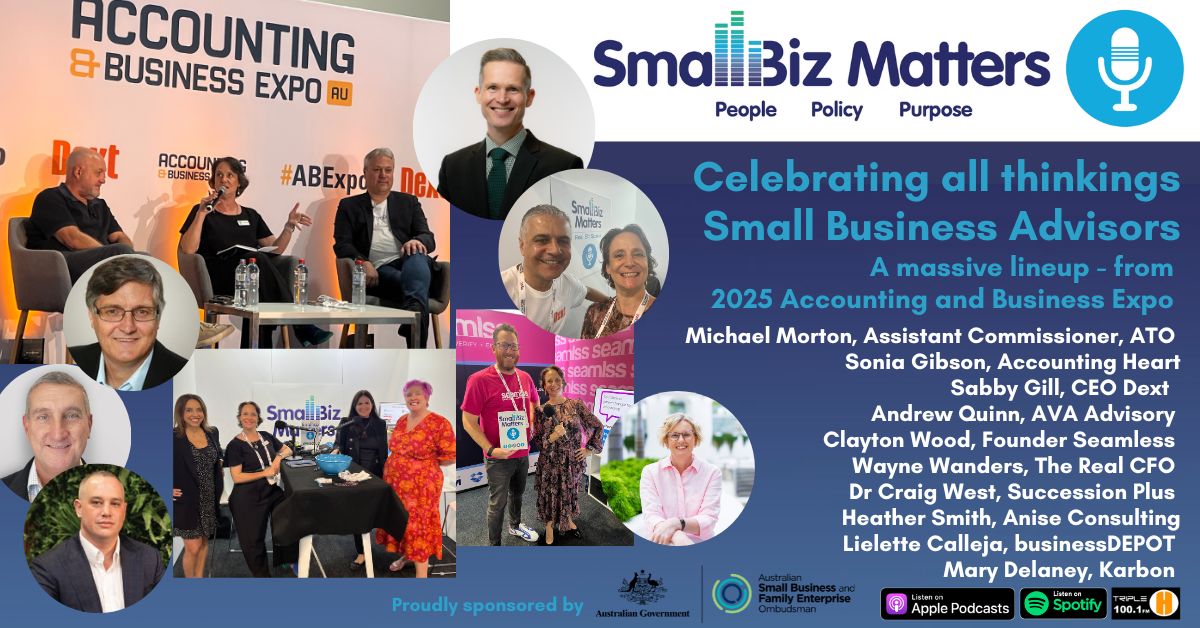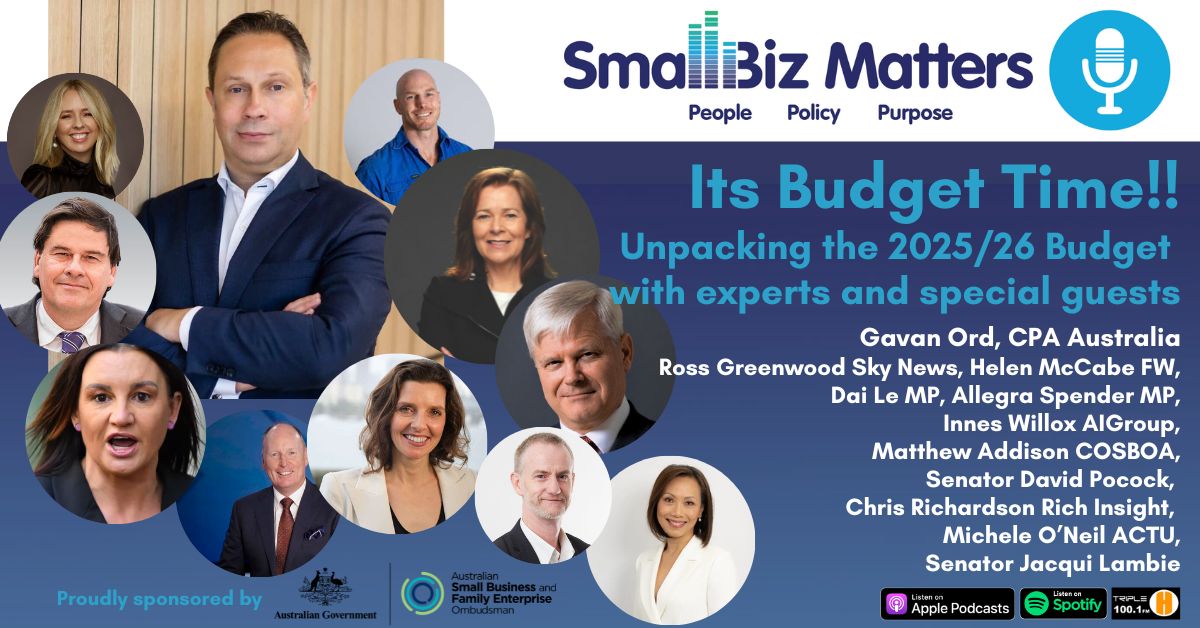Survive & thrive in these uncertain times + HIghlIghting the basic mistooks your copy
| Tuesday May 5Small Biz Matters – a half hour program each week where you can work ON your business rather than IN it.
with Alexi Boyd, broadcaster, advocate and small business owner.
Date: 5 May 2020
Business Survival Guide ~ Helping businesses survive & thrive in these uncertain times
With special guest Wayne Wanders, the Real CFO
Can you remember the last time your business was impacted in the way it has been in the last 2 months? Or how fast and furious the impact on the whole economy; therefore your clients, suppliers, stakeholders, connections (basically everyone) have been affected?
The biggest question of all, were you ready for this?
We didn’t have a crystal ball but if you and your business lived through the GFC or had a major downturn did you take that experience and learn from it, creating a form of preparedness which might have helped? Well, you probably didn’t have the right person with you to recognise this experience or help you learn from their’s.
Wayne Wanders is a virtual CFO who brings with him 35 years as a certified accountant and decades of experience with real businesses at every stage of their lifecycle. He doesn’t just gift advice he rolls up his sleeves and works alongside the businesses to understand how their businesses work and get back in control.
Welcome to the show Wayne.
Topics we’ll be covering:
Decisions around staff
- Remember for most businesses your staff is your most important asset. You need to make sure you look after them, otherwise when the economy turns, they may leave you and you can’t deliver when the opportunity is there.
- Key decisions you can make around your staff include:
- Identify those staff that support your existing customers and those who don’t.
- For those staff that are not supporting your existing customers, determine what you can do to reduce costs. Do you really need this position? Can they work less days or take a commensurate pay cut? Do they have leave they can take?
- what can be done to make them more effective?
- If you are cutting salaries, make sure you are taking less as well. Staff won’t like if they are the only ones with reduced incomes
- Just remember:
- Just be aware that inefficient and ineffective staff are often outputs of inefficient and ineffective systems and processes. In this scenario, don’t forget one of the golden rules which is, challenge all business assumptions and ask if the business can be done another way.
- It is always easier to change processes in slow times than rush times. In rush times people take shortcuts, which may hurt in the longer run. In slow times people have the time to implement the change properly and things run smoother afterwards.
Decisions around expenses
- Key rules:
- Don’t be petty, unfair or unreasonable with your staff.
- Make sure decisions do not adversely impact your existing customers
- Look at the list of items you are spending money on, don’t forget those pesky direct debits.
- Can you now do that meeting via Skype saving on travel?
- What suppliers can you go to and re-negotiate prices.
- If you carry stock, what can you do to reduce stock levels? (slow moving stock- get cash by selling at a discount and don’t reorder in the short term.)
- Can you use a credit card to extend payment terms?.
- Can you extend payment terms with your supplier?
- Can you short term lease some equipment rather than buying it?
Looking after your existing customers
- Unless you are in a recession proof industry you may need to let go of any ambition for short term growth and instead focus on avoiding collapsing and calling in the administrator. Do, focus on is your existing customers. Generally, the second biggest asset of your business!
- It is cheaper to keep an existing customer than win a new customer.
- If you need to cut costs, make sure it does not adversely impact your existing customers.
- If at all possible, do something to improve the benefits you provide to your existing customers. Maybe it is better customer service. Maybe you have been able to reduce some costs and you pass some of this onto your customers.
- Tell your customers what you are doing to help them!
- Now if you do this well, when the economy turns, you are ready to restart your growth with your existing loyal customer base. And you can take advantage of the opportunities presented by other competitors not servicing their clients properly, and possibly not even surviving.
To find out more go to their website: www.arealcfo.com.au
Leaning from the expats : HIghlIghting the basic mistooks your copy
With special guest Adam Zuchetti, journalist and copy expert!
Are you a wordsmith?
One skill many small businesses lack is the ability to sing our own praises. And it means that our website, our social media posts and any copy we write lacks that which it is intended - to advertise us. It also means that your grant funding applications, attempts to win business awards or attract positive media coverage might fall short of highlighting your achievements and you miss out because you’re not fantastic at constructing sentences oozing with your own praises.
Here’s a question: If you read the copy on your website, would grammatical errors jump out at you like they would your reader, who might think that’s unprofessional? Similarly, can you sit down and answer several questions about your successes and your journey?
Or, are you like many businesses, not so crash hot at the word thingy.
Well, today on Small Biz Matters we’re going to learn from an expert - Adam Zuchetti is a freelance journalist and copywriter, with over 13 years’ experience across business, real estate and personal finance. He was the long-time editor of My Business – one of Australia’s longest-running publications for small and medium businesses – and host of its podcasts, webcasts and the high-profile My Business Awards. Adam also recently launched into business for himself, co-founding personalised pet subscription and gifting business Paws N’ All (so he knows all about starting from scratch like the rest of us!)
Welcome to the show Adam.
Topics we’ll be covering:
- What should be your process when creating a written piece of content (journalism)
- Common mistake is to start at the beginning. But what do you want to achieve: what’s your purpose for writing this? Is this marketing? Is it social to be shared? Is it an award submission? Is it a government briefing/proposal? Look at the end messaging first and what result you hope it generates for you, then work backwards.
- Plot out with your main bullet points such as research, an interview, testimonials & key messages
- Think about the tone you want to use. Government should be formal, but marketing can vary depending on the type of customer you want to attract and whether you offer a premium, discount or mid-level type of service. Social media is generally quite conversational and often uses abbreviations.
- For digital texts, take a look at your SEO too - that’s search engine optimisation, or how easy it is for Google to find you. You may have dedicated keywords or keyphrases that you should incorporate into your copy & headings, or hashtags to include on social media.
- Be flexible - You have an idea of what YOU want but the research, or the info from another person might be a real nugget you need to allow to develop
- Then write your heading and especially your opening paragraph LAST.
- When working with a journalist for the purposes of PR, what do you suggest is a good way to approach them to suggest a piece of content? Few key tips:
- Target the right media. You’d be surprised as a business journalist the number of pitches I receive about home decorating tips! It’s exactly the same as customers coming to your restaurant looking to buy light globes and hammers, for example. I’d also say that, just like any type of content you create, it will depend on what you’re hoping to achieve. Local media - radio, newspapers, newsletters, community Facebook groups etc - can be great for reaching out to customers; industry media can position you as a technical expert/innovator in your field’ small business media are always looking for stories that inspire others or demonstrate learnings that others can follow.
- Pitch it at a time you’re available to talk. I once received a great pitch about a really topical news subject, but when I tried contacting the business owner for an interview, it turned out he was away on holiday for 2 weeks with no phone access. So story didn’t run, and they’d wasted the spending on PR.
- If you’re offering a customer as a case study, prep them first on what to expect and what you’d like them to convey. (e.g. example of the real estate agent & grieving widower)
- I always recommend you set up a Google Alert - that way you can track what is being said about you and your business online. This will email you a list of links to posts or articles that mention you - and not just media articles, but things like customer reviews too!
- Finally, remember that a journalist is a person just like you! We’re not the devil out to get you. And we may just become a new customer of yours if you show us the same level of honesty, friendliness and integrity that you show other customers!
- Grant writing - What are the typical mistakes you see which can see people making in the places where they really should be:
- Autocorrect issues, apps which help you write - e.g. Volvo incident on Twitter
- Typos are such easy mistakes to fix but can really work against you/make you look cheap & nasty and not attentive to detail “e.g. manging director”. I’ve even seen someone spell the name of their own business wrong!
- Make sure you answer the question - even if it seems like it’s the same question worded differently. And answer it fully - you have failed if your reader is left with more questions than answers or has to look elsewhere to fill gaps in their knowledge.
- Copy & paste is the devil - looks lazy, particularly bad if you’re positioning yourself as a leader in your field.
- Rushed applications. This isn’t school leaving your assignment until the night before - rushed copy shows through, and again, it’s not a good look.
- Waffling is never good. Have your key points, deliver them concisely and back it up with supporting evidence.
- Is it really obvious as an award judge when other people are writing a submission for you?
- It can be, but that’s why professional writers exist! You can also use someone who knows you as a person. Want those first-hand insights, experiences, stories, anecdotes to make your story come to life.
- Marketing speak can stand out and work against you - it’s basically just the pushy salesperson in written form.
- But on the flipside, I’ve seen business leaders win awards where the submission was entirely written by their staff - that demonstrates just how valued their leadership is!
- At the end of the day, think about who’s reading it: a bored judge won’t be inspired to give you the gong, and a government official won’t be inclined to give you grant funding if you’re not saying more than is already available on your website.
- Is there a disconnect between what you’re writing and what’s being read & how do you fix
- Get someone else to read and critique - ask them what are you trying to say? Even in the media industry, we have this level of secondary oversight through sub-editors.
- Industry jargon. Your customer/reader/whoever may not understand what you’re talking about, even though you understand it inside out.
- Third or first person - more empowering & trustworthy to use I/us/we. We is great too, as it gives the warm and fuzzy feeling of being part of a community, versus the more dictatorial reception of I say this, you do this.
- Can you make it personal? Asking “How can we help you?” sounds rhetorical or hollow, but “how can we help you, Alexi?” is very direct and almost demands a response.
- Don’t forget about your team and how they can contribute - integrating customer FAQs & feedback to make it real-world relatable (PLUS if your customer-facing staff receive the same FAQs, why not build content around that? You’ll pick up new traffic on Google and new followers on social media; you can also improve your website to (better) answer these questions etc.
- Using this copy for other purposes:
- A grant application can be a great tool for adapting your business plan - risk mitigation, marketing, finances, supply chain, route to market etc.
- It can really be team-building to create content together - everyone has different insights/backgrounds/contributions they can make, which will make your content/award submission/grant proposal much richer & more thorough. And your staff will appreciate being able to contribute.
- Social media is a great testing ground - one technique is delivering a piece of content 5 different ways/on 5 different days & see where you get the best response. Is time of day important for example? Do some words/images work much better than others? The immediate feedback is so valuable. E.g. story of breastfeeding mothers and 2am was a major peak in views.
To find out more go to Adam’s website: www.adamzuchetti.com





